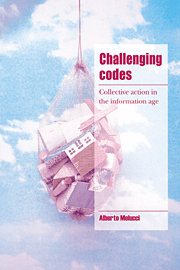Book contents
- Frontmatter
- Contents
- Preface and acknowledgements
- Introduction
- Part I Theory of collective action
- 1 The construction of collective action
- 2 Conflict and change
- 3 Action and meaning
- 4 The process of collective identity
- Part II Contemporary collective action
- Part III The field of collective action
- Part IV Acting collectively
- References
- Index
2 - Conflict and change
Published online by Cambridge University Press: 23 November 2009
- Frontmatter
- Contents
- Preface and acknowledgements
- Introduction
- Part I Theory of collective action
- 1 The construction of collective action
- 2 Conflict and change
- 3 Action and meaning
- 4 The process of collective identity
- Part II Contemporary collective action
- Part III The field of collective action
- Part IV Acting collectively
- References
- Index
Summary
The emergence of collective action
The most simple explanation of the origin of social movements is the one provided by the ruling groups in the society. The ideology of the constituted order defines collective action as irrational and always regards it as ultimately stemming from a conspiracy or a contagion (Moscovici 1981; Graumann and Moscovici 1987; McPhail 1991). Such a theory of bad faith customarily interprets collective action as comprising a ‘decent’ majority which, however unwittingly, becomes guided by deception or by suggestion – and in actuality against its own true interests – by a minority of agitators. Another standard feature of this account is the persecutorial representation of the subject as a threatening, unitary, and organized adversary.
This ideology, which in a subtle manner permeates a great many analyses of episodes of collective action, not only asserts an arbitrary and unscientific anthropology of the deficiencies of human nature, but also bluntly rejects all empirical evidence. In fact, no phenomenon is of greater importance for the analysts of social movements than the complexity of the relations and divisions internal to the collective actor, and the difficulties involved in building unitary action.
If we leave aside these presociological attempts at explanation and instead inspect the contributions made by the sociological tradition, we find a variety of proposals wide enough to resist every attempt at typological classification.
- Type
- Chapter
- Information
- Challenging CodesCollective Action in the Information Age, pp. 42 - 53Publisher: Cambridge University PressPrint publication year: 1996

